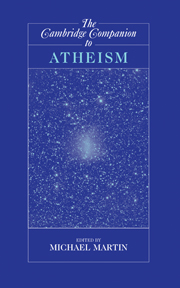Book contents
- Frontmatter
- General Introduction
- Part I Background
- Part II The Case against Theism
- Part III Implications
- 13 Atheism and Religion
- 14 Feminism and Atheism
- 15 Atheism and the Freedom of Religion
- 16 Atheism, A/theology, and the Postmodern Condition
- 17 Anthropological Theories of Religion
- 18 Atheists: A Psychological Profile
- Index
- Series List
14 - Feminism and Atheism
from Part III - Implications
Published online by Cambridge University Press: 28 January 2007
- Frontmatter
- General Introduction
- Part I Background
- Part II The Case against Theism
- Part III Implications
- 13 Atheism and Religion
- 14 Feminism and Atheism
- 15 Atheism and the Freedom of Religion
- 16 Atheism, A/theology, and the Postmodern Condition
- 17 Anthropological Theories of Religion
- 18 Atheists: A Psychological Profile
- Index
- Series List
Summary
In this chapter I explore the question of whether or not feminism is compatible with theism, or whether being a feminist also requires that one be an atheist. By “atheism ” I shall mean what Michael Martin calls “positive atheism, ” the belief that there is no God (Martin 1990: 463- 64). And by “God ” I shall mean “a personal being who is omniscient, omnipotent, and completely good and who created heaven and earth ” (Martin 1990: 463).
The investigation of the relationship between feminism and atheism requires looking at feminist critiques of religion and of theism. I draw not only on the works of feminist philosophers but also on the works of feminist theologians. Throughout this discussion I am primarily concerned with monotheistic religions in the Jewish/Christian/Islamic tradition in the twentieth and twenty-first centuries, and with feminism as manifested since its “rebirth ” during the 1960s within the Western world. This is not to say that other forms and periods of religion are of no interest in the study of atheism, or that either pre-twentieth-century feminism or non-Western feminism of any age is irrelevant to the issue. However, although some feminist discussions of religion acknowledge the role of native religions, Buddhism, and Hinduism, most focus primarily on the Jewish/Christian/Islamic tradition. And most of the systematic examination of religion and theism has been undertaken by feminists within the last thirty years.
- Type
- Chapter
- Information
- The Cambridge Companion to Atheism , pp. 233 - 249Publisher: Cambridge University PressPrint publication year: 2006



